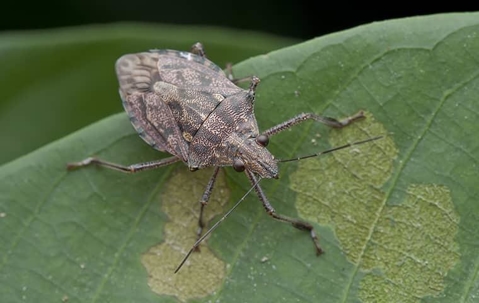Stink bugs (Halyomorpha halys) are named as such because of the powerful odor that they emit as a defense mechanism. Stink bugs are insects that originated in Asia and began appearing in the U.S. during the 1990s. Today, stink bugs are reportedly found in more than 40 states across the country and are a common threat to a variety of agricultural crops.
What can I use to get rid of stink bugs? Residents who are struggling with stink bugs on their property should consult with the pros regarding the best available options for expelling them. An experienced provider of stink bug pest control in Tupelo understands the behavior of these unwanted pests and knows how to effectively solve these problems. While on your property, a Tupelo pest control professional will also look for any vulnerabilities that exist, which could result in other pest-related intrusions.
Stink Bugs Are Pretty Easy To Identify
What do stink bugs look like? Measuring roughly 3/4 of an inch long, stink bugs are insects that have a “shield-like” exterior. Stink bugs have six legs and antennae and appear in a grayish-brown color. Adults have fully developed wings and are capable fliers.
Young stink bugs, known as nymphs, emerge from eggs and appear in shades of red or yellow. Stink bug nymphs develop by shedding their skin – a process called molting.
Do stink bugs invade homes? Yes. Stink bugs and similar types of undesirable creatures will invade homes and quickly expand into an infestation. In these cases, choosing a professional pest control company is strongly encouraged for both effectiveness and safety. The pros operate in ways that ensure the safety of you and your family. Today, these professionals also understand the importance of performing pet-friendly pest control services.
The Problem With Stink Bugs Around Your Property
Why should I be concerned about the presence of stink bugs on my property? Stink bugs have no natural predators and will spread quickly. Fortunately, stink bugs do not bite or sting humans and are largely considered nuisance pests rather than a direct health risk.
Stink bugs are often initially seen by homeowners on their properties as the temperatures cool during the fall when they bask in areas of sunlight. Stink bugs will damage plants throughout gardens and ornamental landscaping. They generally feed by sucking plant juices.
Are there any professional stink bug exterminators near me? Yes. Homeowners in Tupelo can rely on McCary Pest Control for safe, effective, and affordable pest control solutions for stink bugs and other occasional invaders.
Tips To Make Your Property Less Attractive To Stink Bugs
What are some of the most effective prevention methods that will help deter stink bugs? Property owners in Tupelo should consider the following best practices:
- Limit indoor access by sealing the frames of entry doors and repairing or replacing damaged window screens.
- Turn off bright outdoor lights around the home to avoid attracting these pests.
- Keep tree branches and shrubs trimmed away from your home and remove unnecessary debris around exterior walls.
While these strategies are viable preventative options, those already experiencing substantial problems with stink bugs should promptly consult with a local pest control company.
Contact The Pros For Total Stink Bug Control
What are the best options for ousting stink bugs on my property? Homeowners often try mass-marketed home pest control options sold by local retailers, which prove insufficient against these resilient pests. The best option involves consulting with a local pest control company that knows how to get the job done.
McCary Pest Control is a leading stink bug exterminator in the Tupelo region. We employ a team of qualified pest management professionals who receive high-quality training. After receiving an inquiry from a local homeowner facing bothersome pests, we will deploy a specialist to the property to conduct a detailed assessment and determine the best course of treatment.
For further information, contact our office today.

